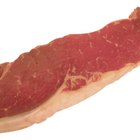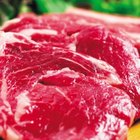chas53/iStock/GettyImages
Many forms of deli lunch meat, including roast beef, contain chemical nitrates that help preserve the meat and slow bacterial growth. Some brands offer nitrate-free lunchmeat, clearly marking the package with such information. Yet others opt for plant-based nitrates such as celery juice that provide the same benefits as manmade nitrates, without the chemicals.
Product Lines
More and more deli meats are made without nitrates, but some manufacturers produce roast beef both with nitrates and without. Products without nitrates typically proclaim that status on the front of the label, and products with nitrates will list them on the ingredient list. Read labels on all sides of the package to be sure. Just because a deli roast beef has special processing, such as eliminating additional salt, doesn't mean that it's nitrate-free.
Visual Clues
The rosy pink color that you see in bacon, deli roast beef and other cured meats typically comes from the chemical nitrates that are added during processing. But some manufacturers use beet juice to add the same rosy color, making a visual identification of nitrates unreliable. However, if you have a choice between deli roast beef slices that are bright pink and slices that look more like cooked roast beef, chances are that the more colorful variety contains nitrates.
Nitrate Advantages
Along with giving roast beef a rosy hue, nitrates decrease the chances that deli meats, including roast beef, will turn rancid and develop strange odors. Most importantly, nitrates slow the growth or kill dangerous bacteria such as staphylococcus aureus and clostridium botulinum, which causes botulism. But nitrates in cured meats react with the meat to form nitrosamines, which may do more harm than good in your body.
Nitrosamines
Nitrosamines, the chemical compounds formed from the reaction of nitrates and heat, cause cancer in experimental trials and are believed to cause stomach cancer in humans too, although some groups dispute those claims. While small amounts of nitrates and nitrosamines occur naturally in some foods, such as fish, beer and tobacco, more nitrosamines form when stomach juices react with nitrates from products such as cured meats.
Plant-based Nitrates
Nitrates also occur in nature and are quite common in plants. Many deli meat companies offer healthier versions of their products, created with minimal processing. In doing so, they may use plant-based nitrates such as celery juice as a preservative. Celery has a high nitrate content on its own.
Related Articles

List of Foods That Are Commonly ...

Is a Roast Bad If It Turns Brown?

What Is Liverwurst Made Out Of?

Difference Between Canned Pumpkin & ...

Does Simmering Ground Beef Make It More ...

Is Allantoin a Relative of the Lanolin ...

Uses of Saltpeter in Food

The Difference Between a Sirloin Roast ...

Benefits of Raw Milk

Where to Buy Pomegranate Juice

Foods Containing Nitrates

What Does Spoiled Meat Smell Like When ...

How to Know if Beef Cubes Are Bad

What Causes Raw Steaks to Lose Red ...

Ham Nutrition Information

Side Effects of Monosodium Glutamate

Why Do Pork Chops Turn White?

List of Retinoids

How to Freeze Tzatziki

Health Benefits of Organic Foods Vs. ...
References
Writer Bio
Susan Lundman began writing about her love of cooking, ingredient choices, menu planning and healthy eating after working for 20 years on children's issues at a nonprofit organization. She has written about food online professionally for ten years on numerous websites, and has provided family and friends with homemade recipes and stories about culinary adventures. Lundman received her M.A. from Stanford University.